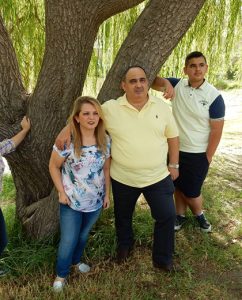Refugees, migrants vote in their first federal election
Around 378,000 newly minted Australian citizens voted in last month’s federal election – the most at any election in history.
And, according Australian Electoral Commission and Department of Social Services data, among the new citizens voting were more than 15,000 former refugees, many who have never voted before or have voted only under duress.
In recent months more than 80 per cent of new citizens enrolled to vote within three months of their citizenship ceremony.
Among the new citizens voting for the first time are Osama Butti and his wife, who with his wife escaped ISIS terror attacks on the streets of Baghdad. They were the first of the extra 12,000 refugees the then Australian Prime Minister Tony Abbott announced Australia would accept in 2014.
Now, as recently confirmed Australian citizens, they voted in a federal election for the first time.
“When we came to Australia I felt like we had won the lottery and getting our citizenships and being able to vote feels like we have won the lottery a second time,” Mr Butti said.
 “Here in Australia you can feel democracy at work. We are free to choose whoever we want. You can see the programs and plans of each of the parties and candidates and make your choice.
“Here in Australia you can feel democracy at work. We are free to choose whoever we want. You can see the programs and plans of each of the parties and candidates and make your choice.
“In Iraq each time you would see the same names and the same candidates, so there was really no choice.
“Becoming citizens was really important for my wife and me. We now feel like we belong somewhere and we can move on with our lives.
“On election day we cast our votes like other Australians. This is a very good thing and a new experience for us.
“It is a privilege and it marks our good luck in becoming a part of this wonderful country,” Mr Butti said.
Former Afghani refugee Barat Ali Batoor also voted for the first time.
“I feel that my vote has an impact and that I’m able to have my say in this process of democracy,” Batoor said.
“I feel that I can have an impact in choosing a government whose policies are most aligned to my beliefs and ideas,” he said.
Batoor said that he had voted previously in Afghanistan but had little trust in the electoral process.
“The feeling of voting in Australia is completely different to voting in Afghanistan. Elections in Afghanistan, even though there was an electoral process established, were mostly rigged and the process was not legitimate,” Batoor said.
“In Australia I feel my vote will be counted and my single vote could make a difference. In Afghanistan, no matter who got the most votes, ultimately the leader would be the person with the most power,” he said.
CEO of migrant and refugee settlement agency AMES Australia Cath Scarth that for many people who have come from countries embroiled in conflict or governed by repressive regimes, being able to vote in a fair and transparent election was “a dream come true”.
“Australians take for granted their right to decide who governs the country and the notion that elections are fair and free from corruption,” Ms Scarth said.
“However, for many new citizens of Australia – especially those who have fled corrupt or repressive regimes – the right to vote is something to cherish and protect,” she said.
“We find that one of the main reasons refugees and asylum seekers leave their home country is to find safety and security.
“But another reason is the chance to participate in a democratic civil society. For many new citizens, the right to vote is an affirmation of their refusal to accept life under brutal, corrupt or repressive governments,” Ms Scarth said.
Ms Scarth said part of AMES Australia’s mission was to help orientate newly arrived refugees and migrants to Australian society and part of that work was to help them understand the electoral process.
“Australia’s preferential voting system, particularly, can be confusing. So we work with the Australian Electoral Commission to help newly arrived citizens to understand how the system works and also the mechanics of actually voting,” she said.
“We also stress that voting in Australia is compulsory and that it is a safe and normal thing to do,” Ms Scarth said.












